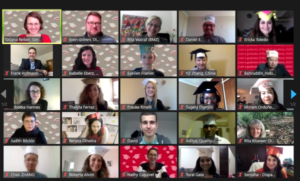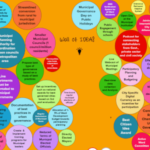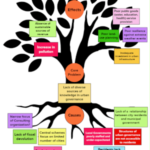
Corona has evidentially changed the world as we know it and pushed us out of our comfort zone to develop new solutions to tackle new challenges. This also included the MGG Academy, which usually takes place as a four-month dialogue and trainings programme at the German Development Institute / Deutsches Institut für Entwicklungspolitik (DIE) in Bonn.
Instead of traveling to Bonn, 24 young professionals from China, India, Indonesia, South Africa, Brazil, Mexico and Europe embarked on 17 August 2020 on a digital learning journey into the world of international cooperation and sustainable development. While the switch to digital collaboration in itself is already a challenge and meant experiencing an unknown world of MS Teams, Zoom, Mural and many other digital tools, the Academy team had to develop innovative solutions to overcome additional structural burdens, which were caused by the need to incorporate 8 different time zones. This meant that the synchronous working-time, when all participants could come together simultaneously, was very limited and thus, resulted in a part-time programme with asynchronous and self-organized smaller learning-units.

Despite these structural and general challenges, the Academy was able to find innovative ways to connect, work, co-create and enjoy the MGG culture with the participants. The digital space offered the opportunity to include a plethora of different voices and diverse perspectives from all over the world (39 speakers in total), which would not have been possible in a physical format. Additionally, the participants connected over sharing their country specific contexts and realities, as everyone continued their “normal” life next to the Academy amidst a global pandemic. These shared experiences resulted in a momentum and were an “unexpected gift”. It allowed us to achieve something big, while we were finding new ways of connecting with each other. We started passion projects and impact networks that now, for the first time, were created in a digital rather than a physical space, which means it is far more likely that we will be able to continue working together well after the academy has concluded” (Serusha Govender, participant of the MGG Academy 2020).

The desire to meet face-to-face one day was persistent throughout the Academy and we are convinced that physical programmes will not and cannot be replaced entirely through digital alternatives. Nevertheless, the participant’s concluded at the end of their digital MGG journey in December, that “to us, having participated in the Academy means, we are prepared for the future of global collaboration in the virtual space. The Academy helped us to become change makers who are aware of the challenges and opportunities of working together digitally” (Frauke Rinelli, participant of the MGG Academy 2020).

Schreibe einen Kommentar